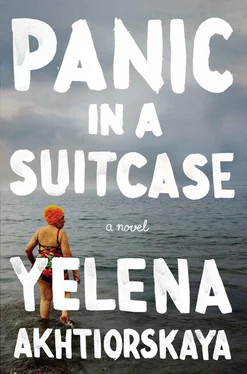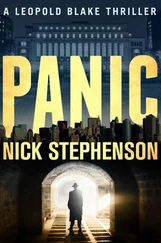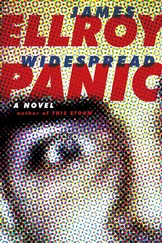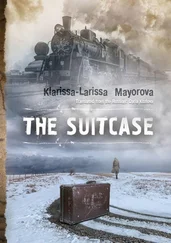Tired of studying the frilly hems and see-through patches of Sveta’s underwear, she looked down and found herself clutching Pasha’s book — she must’ve grabbed it off the shelf on the way to the bathroom by reflex. She brought its spine to her nose. It smelled of dust and purpose. This insensible man was it. Who better to write Pasha’s biography? Someone would have to do it, and considering Pasha’s wealth of enemies, his radical — at least by the day’s standard — sense of privacy, his intolerance of gossip and insistence on historical accuracy and precision, it was in his interest that his niece be the one. She’d need to buy a tape recorder, a marbled notebook, a pen. She’d interview mercilessly. It would be eight hundred pages, a scholarly tome examining Pasha’s life, analyzing every one of his works and wives.
But she didn’t know the first thing about biographies. Where did one begin, especially with a story so tangled from the very start? The great Russian poet Pavel Robertovich Nasmertov, who wasn’t really Russian considering that he’d never lived in Russia proper but in Ukraine, only don’t dare call him Ukrainian, and furthermore was Jewish, which in Russia qualified as a separate nationality if not species, though he wasn’t really Jewish, having converted to Orthodoxy, was born on November 20-something in the year 1950-something in Odessa, a city where he’d lived his entire life, although hadn’t he actually been born elsewhere, and neither could this still be considered the same Odessa, as what remained of the city was a shell of its former self, full of recent transplants and ruthless hostility to the Poet who’d remained? (It would probably be necessary at this juncture to mention that practically the entire Jewish population had relocated to Brighton’s stinky hub, without making it too obvious that she believed that old Odessa’s greatness lay solely in its Jews.) Frida had never been diligent or thorough. Facts were nothing but a nuisance. She’d have to defer to her uncle on many complex matters. Would her temperament allow her to take dictation? And would she be able to swallow her personal feelings and opinions in order to pen an objective account? But she was getting ahead of herself — in order to put aside personal feelings and opinions, she’d first have to figure out what they were. The effort struck her as nothing short of impossible.
A not-terrible place to get started, however, was the poems. The poems! Here they were, sitting quiet in a worn jacket. Just as she cracked the cover and began to make fumbling attempts to decipher the Cyrillic, she was reminded by a wild banging that she’d been camping out for over an hour in a very prime location, to the great frustration of the rest of the household. Volk, it’s true, had been created to survive in the desert and went for days without an ounce of water coming or going, and the children could relieve themselves in the courtyard, but the wife had given birth to those children and wished that one day Frida would discover what that did to a bladder.
IN THE LAND OF GEORGIA, the poets were sporting fresh tans and new necklaces as they arrived from a day trip to the seaside town of Poti and were distributed among the forty-nine floors of Hotel Skyscratcher, which compensated for its location on the frayed hem of the outskirts of Tbilisi with an Olympic-size swimming pool and three Ping-Pong tables, though only the negligible poets from Bulgaria were intent on making use of them. That evening a banquet was held in their honor in the airy palm-tree-lined lobby, and it somehow never ended, perhaps because the poets kept eating and drinking until it was time for the staff to set up for breakfast. The banquet turned into a permanent fixture, as the hotel manager, a short young man with mischievous eyes, seemed to understand that poets couldn’t be expected to abide by regular mealtimes, getting hungry at all hours of the day and night. Some smoked fish, suluguni, dwarf cucumbers — nothing spectacular, but better than nothing. There was a late-morning scuffle, however, in the course of which the electric samovar was knocked over and scalding water flew everywhere, burning the scrawny bald poet who’d been shoved into the impressive machine. The nearest hospital was hours away and technically in a different district, so he was taken to the hotel manager’s brother-in-law’s father’s house, whose basement served as a private clinic. Nobody knew the poet’s name, but everybody agreed that he had it coming. Since the festival’s opening, he’d been laughing deliberately at inappropriate moments and chewing loudly throughout the readings and performances, asking baffling questions during the question-and-answer portions, and behaving very coarsely with the poetesses and poets’ wives, who didn’t seem to mind. The elderly woman who accompanied him everywhere, assumed to be his mother, disappeared with him. After the incident the hotel threatened to remove the banquet, since perhaps it was a bad idea to have so many hot-blooded poets congregating in the lobby at all hours, eating spicy foods and washing them down with spiked tea. But the poets didn’t want to be so inconvenienced as to have to find another venue to fit the whole lot of them, especially considering that for miles around there was nothing but barren, scorched earth. They promised to be on their best behavior and leave large tips. They’d developed a deep fondness for the lobby. Every corner of it had been claimed. It was divided into thirty-two sections, which was the number of countries represented that year in the festival. Of course, none of them stayed in their own nation’s section, or even visited, but they knew it was there in case a return became necessary.
About eight hours after the first incident, there was another, a skirmish among the Romanians, who were surprisingly active this year and producing stellar work (that made you want to slit your wrists). This time the injured included an elderly Georgian waiter who happened to be the disabled uncle of the hotel manager. Everybody kept saying disabled uncle until the two words merged, but nobody mentioned disabled how. The banquet was cleared. The problem was that there were so many of them. The number of attendees had more than doubled from the previous year. No longer was it exclusively poets — dramaturges, translators, editors, publishers, and journalists were now welcome to take part, and had anybody ever heard of a translator turning down an invitation? In the months leading up to the festival, an additional effort had been made to attract young poets, because apparently it was very important that the younger generation of writers feel connected to a long-standing tradition and not just, as one coordinator put it, stew in their own juices, but the suspicion was that the festival organizers wanted nice photos of good-looking people to display on the festival’s website. Writers in general weren’t the most attractive bunch, but in the previous years the average age of the participants had been sixty, and not the new sixty; both on the stage and off and everywhere you looked, it was just old-fogy poets who either never showered or had sweat-gland issues and smiled black, toothless smiles, and even they were moved to a quick bath or a shave or an appointment with the dentist after clicking through those pics.
A few poets took the organizational effort upon themselves, trying to ensure that a new venue be found and agreed upon by all, a place that would preserve the collective unity but still have a casual atmosphere and enough space for people to wander around and not feel the pressure to interact constantly, and which would have those dwarf cucumbers cut into halves and peeled. Basically, they wanted to find another lobby banquet. For some reason they started collecting signatures. They were very much against what seemed to already be naturally occurring — namely, that after the scheduled events of the day ended, different groups went off into different directions, because in the previous years when there had not been so many of them, they had done everything together, and they believed that the entire point of such a festival was to make new friends and contacts, not just stick with those you already knew. They were sad, lonely people, engaged in a noble, if impossible, pursuit.
Читать дальше












